The Cambridge History of China. Vol. 12: Republican China, 1912-1949, Part 1
Подождите немного. Документ загружается.

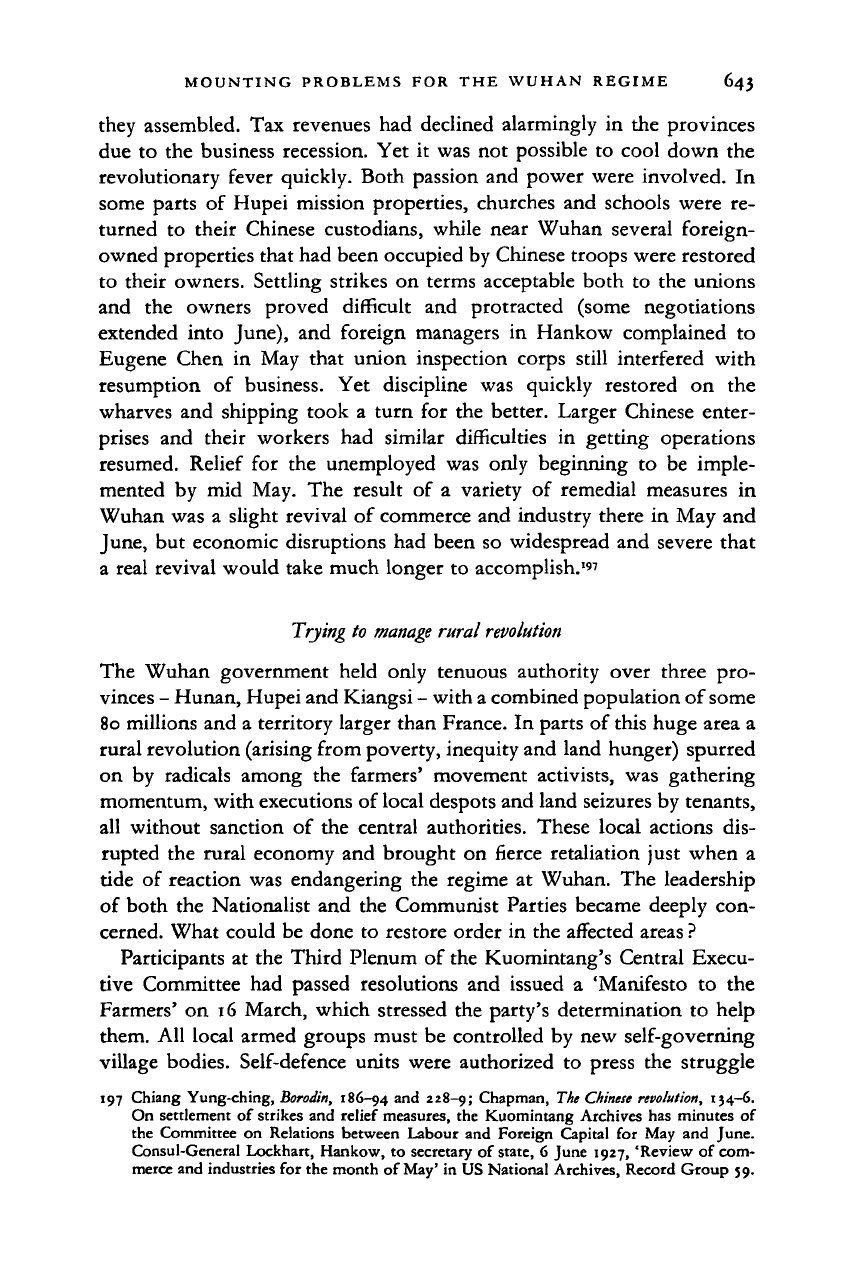
MOUNTING PROBLEMS FOR THE WUHAN REGIME 643
they assembled. Tax revenues had declined alarmingly in the provinces
due to the business recession. Yet it was not possible to cool down the
revolutionary fever quickly. Both passion and power were involved. In
some parts of Hupei mission properties, churches and schools were re-
turned to their Chinese custodians, while near Wuhan several foreign-
owned properties that had been occupied by Chinese troops were restored
to their owners. Settling strikes on terms acceptable both to the unions
and the owners proved difficult and protracted (some negotiations
extended into June), and foreign managers in Hankow complained to
Eugene Chen in May that union inspection corps still interfered with
resumption of business. Yet discipline was quickly restored on the
wharves and shipping took a turn for the better. Larger Chinese enter-
prises and their workers had similar difficulties in getting operations
resumed. Relief for the unemployed was only beginning to be imple-
mented by mid May. The result of a variety of remedial measures in
Wuhan was a slight revival of commerce and industry there in May and
June,
but economic disruptions had been so widespread and severe that
a real revival would take much longer to accomplish.
1
'
7
Trying to
manage
rural
revolution
The Wuhan government held only tenuous authority over three pro-
vinces - Hunan, Hupei and Kiangsi - with a combined population of some
80 millions and a territory larger than France. In parts of this huge area a
rural revolution (arising from poverty, inequity and land hunger) spurred
on by radicals among the farmers' movement activists, was gathering
momentum, with executions of local despots and land seizures by tenants,
all without sanction of the central authorities. These local actions dis-
rupted the rural economy and brought on fierce retaliation just when a
tide of reaction was endangering the regime at Wuhan. The leadership
of both the Nationalist and the Communist Parties became deeply con-
cerned. What could be done to restore order in the affected areas ?
Participants at the Third Plenum of the Kuomintang's Central Execu-
tive Committee had passed resolutions and issued a 'Manifesto to the
Farmers' on 16 March, which stressed the party's determination to help
them. All local armed groups must be controlled by new self-governing
village bodies. Self-defence units were authorized to press the struggle
197 Chiang Yung-ching,
Borodin,
186-94 and 228-9; Chapman, The
Chinese
revolution,
134-6.
On settlement of strikes and relief measures, the Kuomintang Archives has minutes of
the Committee on Relations between Labour and Foreign Capital for May and June.
Consul-General Lockhart, Hankow, to secretary of state, 6 June 1927, 'Review of com-
merce and industries for the month of May' in US National Archives, Record Group 59.
Cambridge Histories Online © Cambridge University Press, 2008

644 THE NATIONALIST REVOLUTION, 1923-8
against 'local bullies and evil gentry', and lawless landlords. The CEC
affirmed the Kuomintang's support for farmers in their struggle to possess
the land, and suggested confiscation
of
the lands
of
counter-revolution-
aries which, together with public and temple lands, should be turned over
to local land commissions under the jurisdiction
of
district and village
self-governing organs for distribution among the people. Most
of
these
proposals had appeared as resolutions
of
the December congress
of
the
Hunan Farmers' Association, and were Comintern policy. The plenum
also authorized establishment
of a
Central Land Commission
to
work
out details of the new, more militant, social policy.'
98
On the basis of this lead, local organizers, particularly in Hunan, began
a campaign
in
March
to
extend self-government under the direction of
farmers' associations
to
all villages.
In
mid April the Hunan Provincial
Farmers' Association, on the authority
of
the Third Plenum resolutions,
sent
a
directive
to
all county associations
to
set up farmers' self-defence
forces; and the provincial Kuomintang Propaganda Office issued
a
pro-
paganda outline that emphasized the need for struggle against feudalism:
the time had come,
it
said,
to
support the peasants' demand for land. At
the end
of
the month the Provincial Farmers' Association held
a
pro-
paganda week, presenting what became the radicals' standard argument
for the need
to
'solve' the land problem now: the peasantry must
be
mobilized behind the Nationalist government to save it, but the govern-
ment, to mobilize them, must solve their need for land. Solution
of
the
land problem, it was argued, would also solve the government's financial
problem,
for
the new owner-farmers could pay more taxes since they
would no longer pay rent to landlords. Solving the land problem would
provide the basis
for a
nourishing economy
in
the future; but nothing
could be accomplished unless the existing feudal system
in
the villages
was eradicated: landlords must be overthrown and the tillers
be
given
land and political power.
1
" By April leaders
of
the Provincial Farmers'
Association were estimating between five and six million members
in
198 The CEC Plenum's resolution
of
10 March is quoted in full in Tien-wet Wu, 'A review of
the Wuhan debacle: the Kuomintang-Communist split of 1927,'
]AS,
29 (November 1969)
129-30. Also, Carol Corder Andrews, 'The policy
of
the Chinese Communist Party
towards the peasant movement, 1921-1927: the impact
of
national on social revolution',
Columbia University, Ph.D. dissertation, 1978, ch. VII, 61-2, based upon
a
collection of
documents issued
by
the Kuomintang Central Farmers Bureau
on
30 June 1927. Kuo-
mintang Archives, 436/138. Chiang Yung-ching,
Borodin,
268-71,
quoting some passages
from the resolutions. The Manifesto
is
also
in
Chung-kuo Kuo-min-tang
chung-yao
hsuan-ym
htu-pien, 359-65. December resolutions
in
Ti-i-tz'u.
. .
nung-min,
332-40; 373-4. 'Thesis
on the situation in China', of the Seventh Plenum of the ECCI, 22 Nov-16 Dec. 1926,
in
North and Eudin,
M.N.
Roy's
mission
to China, 139.
199 Andrews,
The
policy of
the Chinese
Communist Party, ch. 7, based upon contemporary docu-
ments in the Kuomintang Archives.
Cambridge Histories Online © Cambridge University Press, 2008
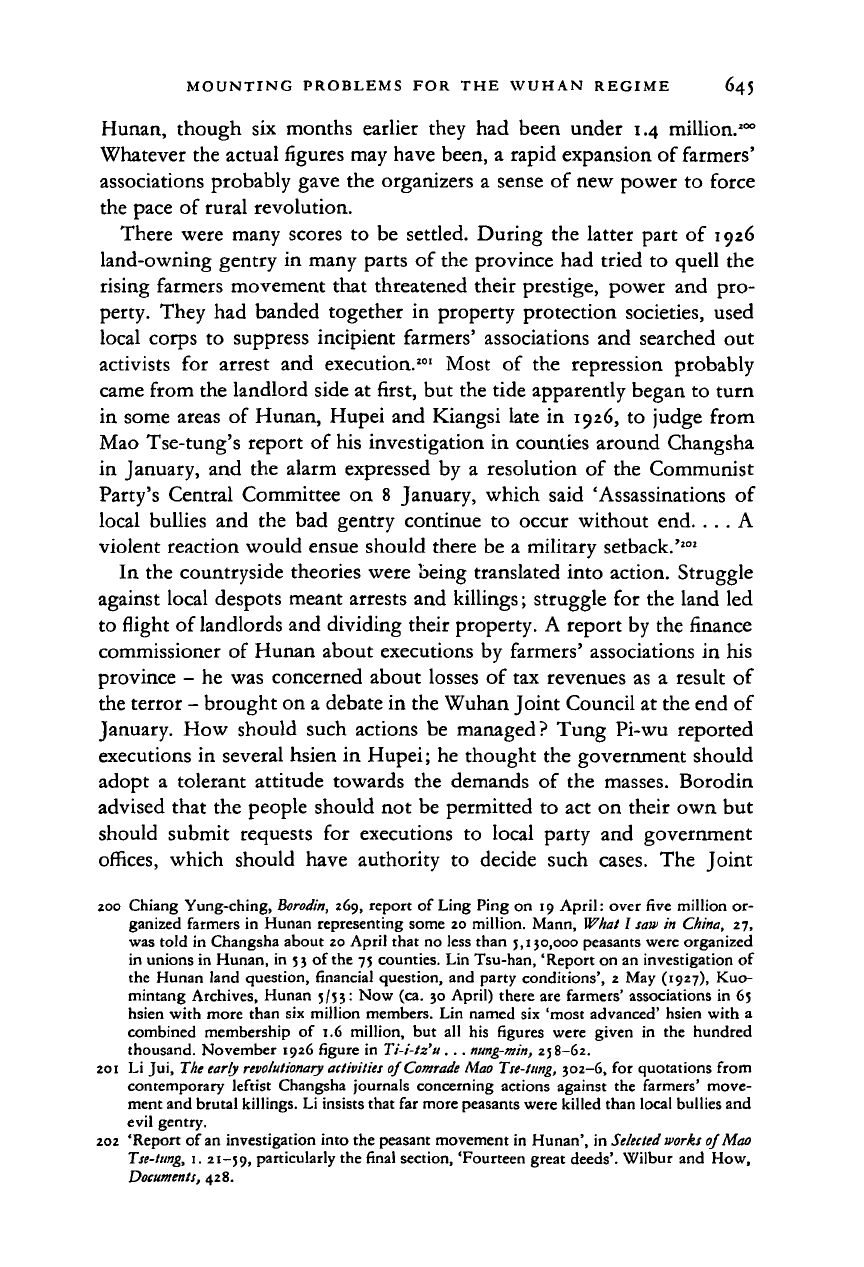
MOUNTING PROBLEMS FOR THE WUHAN REGIME 645
Hunan, though six months earlier they had been under 1.4 million.
100
Whatever the actual figures may have been, a rapid expansion of farmers'
associations probably gave the organizers a sense of new power to force
the pace of rural revolution.
There were many scores to be settled. During the latter part of 1926
land-owning gentry in many parts of the province had tried to quell the
rising farmers movement that threatened their prestige, power and pro-
perty. They had banded together in property protection societies, used
local corps to suppress incipient farmers' associations and searched out
activists for arrest and execution.
201
Most of the repression probably
came from the landlord side at first, but the tide apparently began to turn
in some areas of Hunan, Hupei and Kiangsi late in 1926, to judge from
Mao Tse-tung's report of his investigation in counties around Changsha
in January, and the alarm expressed by a resolution of the Communist
Party's Central Committee on 8 January, which said 'Assassinations of
local bullies and the bad gentry continue to occur without end. ... A
violent reaction would ensue should there be a military setback.'
202
In the countryside theories were being translated into action. Struggle
against local despots meant arrests and killings; struggle for the land led
to flight of landlords and dividing their property. A report by the finance
commissioner of Hunan about executions by farmers' associations in his
province - he was concerned about losses of tax revenues as a result of
the terror - brought on a debate in the Wuhan Joint Council at the end of
January. How should such actions be managed? Tung Pi-wu reported
executions in several hsien in Hupei; he thought the government should
adopt a tolerant attitude towards the demands of the masses. Borodin
advised that the people should not be permitted to act on their own but
should submit requests for executions to local party and government
offices, which should have authority to decide such cases. The Joint
200 Chiang Yung-ching,
Borodin,
269, report of Ling Ping on 19 April: over five million or-
ganized farmers in Hunan representing some 20 million. Mann, What I saw in China, 27,
was told in Changsha about 20 April that no less than 5,130,000 peasants were organized
in unions in Hunan, in 53 of the 75 counties. Lin Tsu-han, 'Report on an investigation of
the Hunan land question, financial question, and party conditions', 2 May (1927), Kuo-
mintang Archives, Hunan 5/53: Now (ca. 30 April) there are farmers' associations in 65
hsien with more than six million members. Lin named six 'most advanced' hsien with a
combined membership of 1.6 million, but all his figures were given in the hundred
thousand. November 1926 figure in Ti-i-tz'u. . .
nung-min,
258-62.
201 Li Jui, The
early revolutionary activities
oj
Comrade
Mao Tse-tung, 302-6, for quotations from
contemporary leftist Changsha journals concerning actions against the farmers' move-
ment and brutal killings. Li insists that far more peasants were killed than local bullies and
evil gentry.
202 'Report of an investigation into the peasant movement in Hunan', in
Selected
works of Mao
Tse-tung, 1. 21-59, particularly the final section, 'Fourteen great deeds'. Wilbur and How,
Documents,
428.
Cambridge Histories Online © Cambridge University Press, 2008
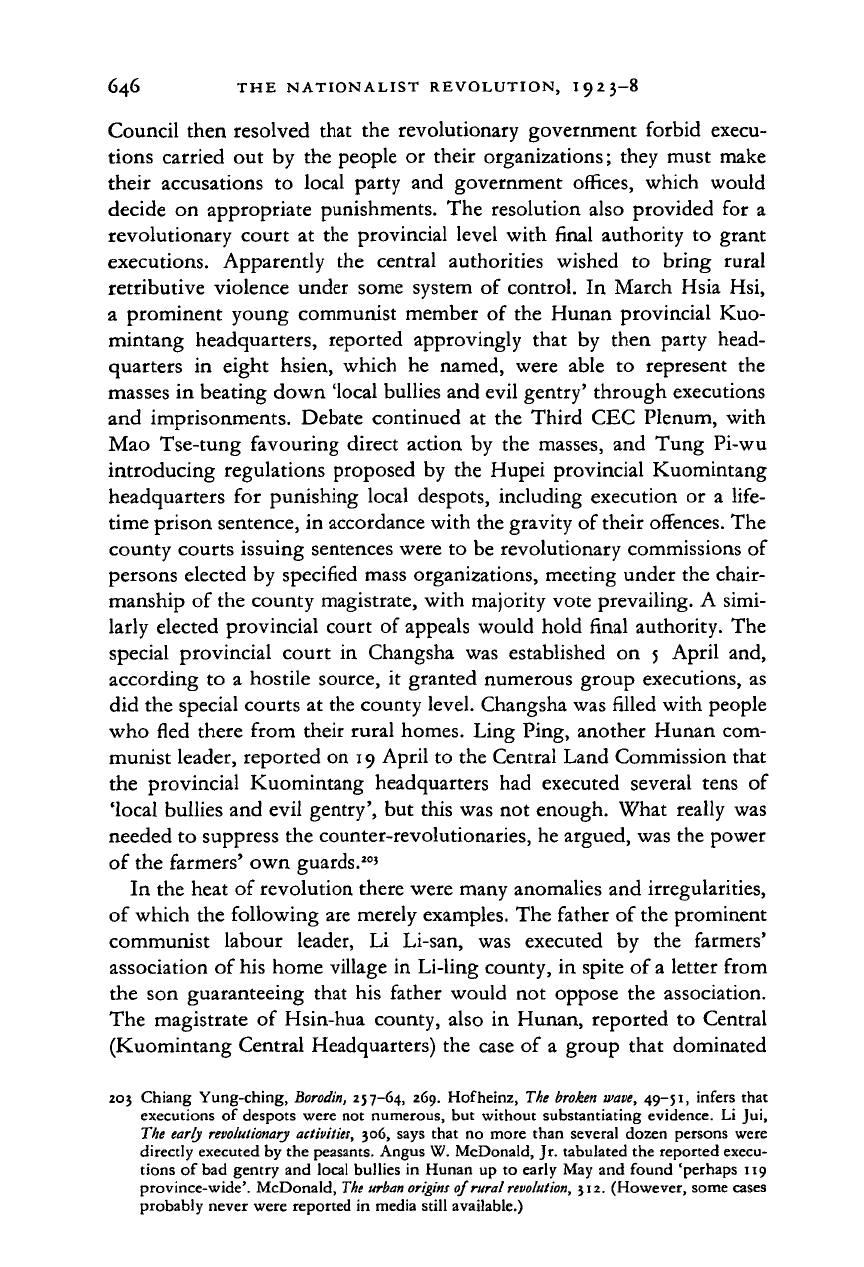
646 THE NATIONALIST REVOLUTION, I 9
2
3-8
Council then resolved that
the
revolutionary government forbid execu-
tions carried
out by the
people
or
their organizations; they must make
their accusations
to
local party
and
government offices, which would
decide
on
appropriate punishments.
The
resolution also provided
for a
revolutionary court
at the
provincial level with final authority
to
grant
executions. Apparently
the
central authorities wished
to
bring rural
retributive violence under some system
of
control.
In
March Hsia
Hsi,
a prominent young communist member
of the
Hunan provincial
Kuo-
mintang headquarters, reported approvingly that
by
then party head-
quarters
in
eight hsien, which
he
named, were able
to
represent
the
masses
in
beating down 'local bullies and evil gentry' through executions
and imprisonments. Debate continued
at the
Third
CEC
Plenum, with
Mao Tse-tung favouring direct action
by the
masses,
and
Tung Pi-wu
introducing regulations proposed
by the
Hupei provincial Kuomintang
headquarters
for
punishing local despots, including execution
or a
life-
time prison sentence,
in
accordance with the gravity
of
their offences.
The
county courts issuing sentences were
to be
revolutionary commissions
of
persons elected
by
specified mass organizations, meeting under
the
chair-
manship
of
the county magistrate, with majority vote prevailing.
A
simi-
larly elected provincial court
of
appeals would hold final authority.
The
special provincial court
in
Changsha
was
established
on 5
April
and,
according
to a
hostile source,
it
granted numerous group executions,
as
did
the
special courts
at
the county level. Changsha was filled with people
who fled there from their rural homes. Ling Ping, another Hunan com-
munist leader, reported
on
19 April
to the
Central Land Commission that
the provincial Kuomintang headquarters
had
executed several tens
of
'local bullies
and
evil gentry',
but
this was
not
enough. What really
was
needed
to
suppress the counter-revolutionaries, he argued, was
the
power
of the farmers'
own
guards.
20
'
In
the
heat
of
revolution there were many anomalies
and
irregularities,
of which
the
following
are
merely examples.
The
father
of
the prominent
communist labour leader,
Li
Li-san,
was
executed
by the
farmers'
association
of
his home village
in
Li-ling county,
in
spite
of
a letter from
the
son
guaranteeing that
his
father would
not
oppose
the
association.
The magistrate
of
Hsin-hua county, also
in
Hunan, reported
to
Central
(Kuomintang Central Headquarters)
the
case
of a
group that dominated
203 Chiang Yung-ching,
Borodin,
257-64, 269. Hofheinz, The
broken
wave,
49-51,
infers that
executions
of
despots were
not
numerous,
but
without substantiating evidence.
Li Jui,
The
early revolutionary
activities,
306, says that
no
more than several dozen persons were
directly executed by the peasants. Angus W. McDonald,
Jr.
tabulated the reported execu-
tions
of
bad gentry
and
local bullies
in
Hunan
up to
early May
and
found 'perhaps
119
province-wide'. McDonald,
The urban origins
of
rural
revolution,
312. (However, some cases
probably never were reported
in
media still available.)
Cambridge Histories Online © Cambridge University Press, 2008
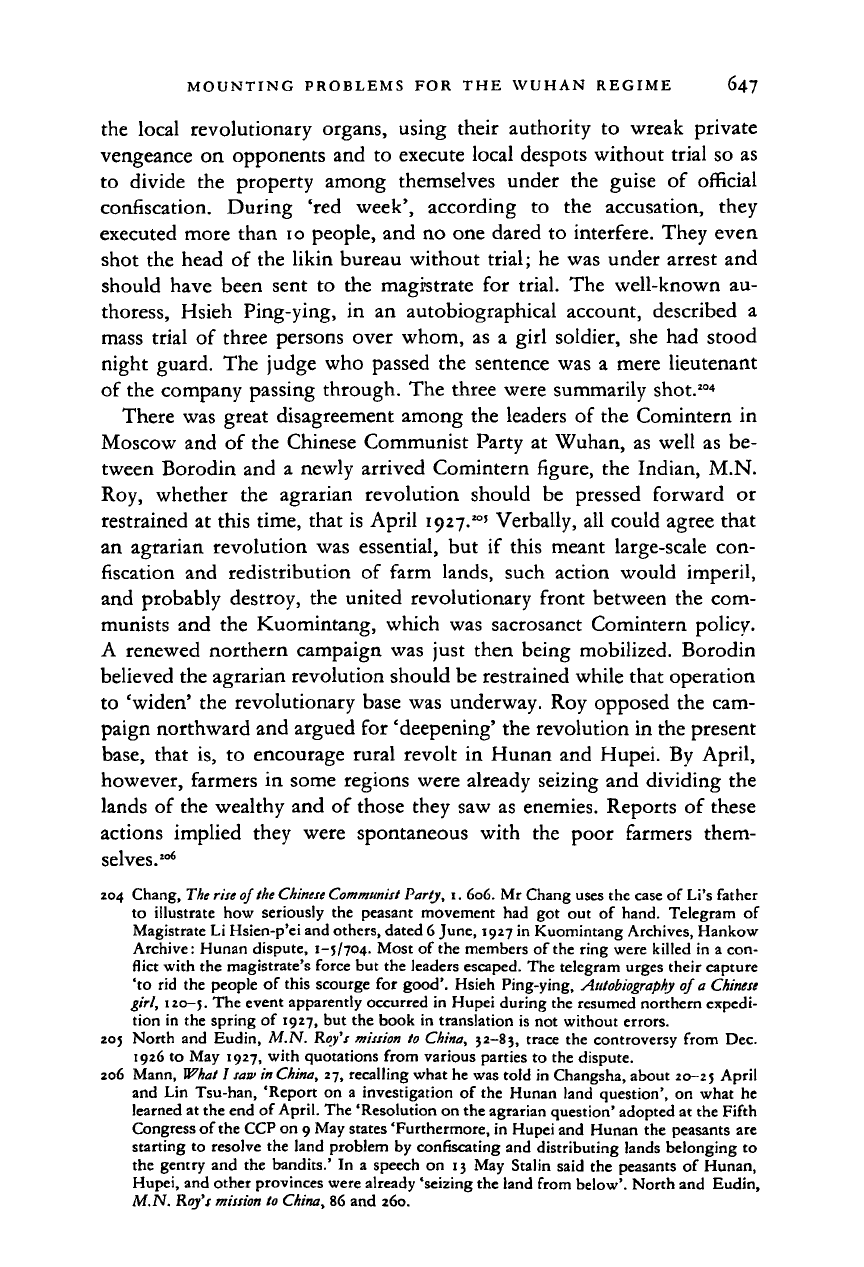
MOUNTING PROBLEMS FOR THE WUHAN REGIME 647
the local revolutionary organs, using their authority to wreak private
vengeance on opponents and to execute local despots without trial so as
to divide the property among themselves under the guise of official
confiscation. During 'red week', according to the accusation, they
executed more than 10 people, and no one dared to interfere. They even
shot the head of the likin bureau without trial; he was under arrest and
should have been sent to the magistrate for trial. The well-known au-
thoress, Hsieh Ping-ying, in an autobiographical account, described a
mass trial of three persons over whom, as a girl soldier, she had stood
night guard. The judge who passed the sentence was a mere lieutenant
of the company passing through. The three were summarily shot.
204
There was great disagreement among the leaders of the Comintern in
Moscow and of the Chinese Communist Party at Wuhan, as well as be-
tween Borodin and a newly arrived Comintern figure, the Indian, M.N.
Roy, whether the agrarian revolution should be pressed forward or
restrained at this time, that is April 1927.
20
' Verbally, all could agree that
an agrarian revolution was essential, but if this meant large-scale con-
fiscation and redistribution of farm lands, such action would imperil,
and probably destroy, the united revolutionary front between the com-
munists and the Kuomintang, which was sacrosanct Comintern policy.
A renewed northern campaign was just then being mobilized. Borodin
believed the agrarian revolution should be restrained while that operation
to 'widen' the revolutionary base was underway. Roy opposed the cam-
paign northward and argued for 'deepening' the revolution in the present
base,
that is, to encourage rural revolt in Hunan and Hupei. By April,
however, farmers in some regions were already seizing and dividing the
lands of the wealthy and of those they saw as enemies. Reports of these
actions implied they were spontaneous with the poor farmers them-
selves.
20
*
204 Chang, The rise of
the Chinese
Communist Party, 1. 606. Mr Chang uses the case of Li's father
to illustrate how seriously the peasant movement had got out of hand. Telegram of
Magistrate Li Hsien-p'ei and others, dated 6 June, 1927 in Kuomintang Archives, Hankow
Archive: Hunan dispute,
1-5/704.
Most of the members of the ring were killed in a con-
flict with the magistrate's force but the leaders escaped. The telegram urges their capture
'to rid the people of this scourge for good'. Hsieh Ping-ying, Autobiography of a
Chinese
girl, 120-5. Th
e
event apparently occurred in Hupei during the resumed northern expedi-
tion in the spring of 1927, but the book in translation is not without errors.
205 North and Eudin, M.N. Roy's mission to China,
52-83,
trace the controversy from Dec.
1926 to May 1927, with quotations from various parties to the dispute.
206 Mann, What I
saw
in China, 27, recalling what he was told in Changsha, about 20-25 April
and Lin Tsu-han, 'Report on a investigation of the Hunan land question', on what he
learned at the end of April. The 'Resolution on the agrarian question' adopted at the Fifth
Congress of the CCP on 9 May states 'Furthermore, in Hupei and Hunan the peasants are
starting to resolve the land problem by confiscating and distributing lands belonging to
the gentry and the bandits.' In a speech on 13 May Stalin said the peasants of Hunan,
Hupei, and other provinces were already 'seizing the land from below'. North and Eudin,
M.N. Roy's
mission
to China, 86 and 260.
Cambridge Histories Online © Cambridge University Press, 2008
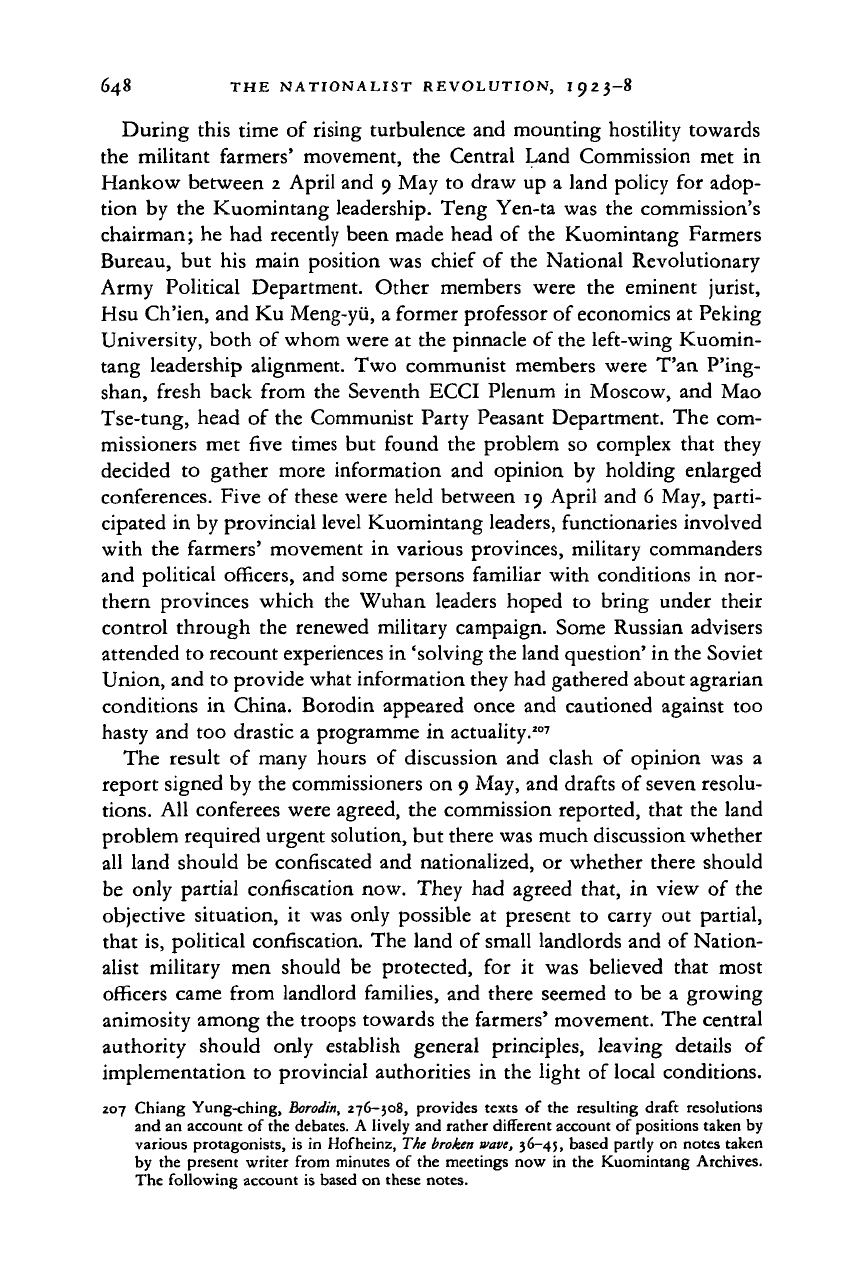
648 THE NATIONALIST REVOLUTION, I 9
2
3-8
During this time
of
rising turbulence
and
mounting hostility towards
the militant farmers' movement,
the
Central Land Commission
met in
Hankow between
2
April
and 9 May to
draw
up a
land policy
for
adop-
tion
by the
Kuomintang leadership. Teng Yen-ta
was the
commission's
chairman;
he had
recently been made head
of the
Kuomintang Farmers
Bureau,
but his
main position
was
chief
of the
National Revolutionary
Army Political Department. Other members were
the
eminent jurist,
Hsu Ch'ien,
and Ku
Meng-yu,
a
former professor
of
economics
at
Peking
University, both
of
whom were
at the
pinnacle
of
the left-wing Kuomin-
tang leadership alignment.
Two
communist members were
T'an
P'ing-
shan, fresh back from
the
Seventh ECCI Plenum
in
Moscow,
and Mao
Tse-tung, head
of the
Communist Party Peasant Department.
The com-
missioners
met
five times
but
found
the
problem
so
complex that they
decided
to
gather more information
and
opinion
by
holding enlarged
conferences. Five
of
these were held between 19 April
and 6
May, parti-
cipated
in by
provincial level Kuomintang leaders, functionaries involved
with
the
farmers' movement
in
various provinces, military commanders
and political officers,
and
some persons familiar with conditions
in nor-
thern provinces which
the
Wuhan leaders hoped
to
bring under their
control through
the
renewed military campaign. Some Russian advisers
attended
to
recount experiences
in
'solving the land question'
in
the Soviet
Union,
and to
provide what information they had gathered about agrarian
conditions
in
China. Borodin appeared once
and
cautioned against
too
hasty
and too
drastic
a
programme
in
actuality.
207
The result
of
many hours
of
discussion
and
clash
of
opinion
was a
report signed
by the
commissioners
on 9
May,
and
drafts
of
seven resolu-
tions.
All
conferees were agreed,
the
commission reported, that
the
land
problem required urgent solution,
but
there was much discussion whether
all land should
be
confiscated
and
nationalized,
or
whether there should
be only partial confiscation now. They
had
agreed that,
in
view
of the
objective situation,
it was
only possible
at
present
to
carry
out
partial,
that
is,
political confiscation.
The
land
of
small landlords
and of
Nation-
alist military
men
should
be
protected,
for it was
believed that most
officers came from landlord families,
and
there seemed
to be a
growing
animosity among
the
troops towards
the
farmers' movement. The central
authority should only establish general principles, leaving details
of
implementation
to
provincial authorities
in the
light
of
local conditions.
207 Chiang Yung-ching,
Borodin,
276-308, provides texts
of the
resulting draft resolutions
and
an
account
of
the debates.
A
lively
and
rather different account
of
positions taken
by
various protagonists,
is in
Hofheinz,
Tie
broken
wave,
36-45, based partly
on
notes taken
by
the
present writer from minutes
of the
meetings
now in the
Kuomintang Archives.
The following account
is
based
on
these notes.
Cambridge Histories Online © Cambridge University Press, 2008
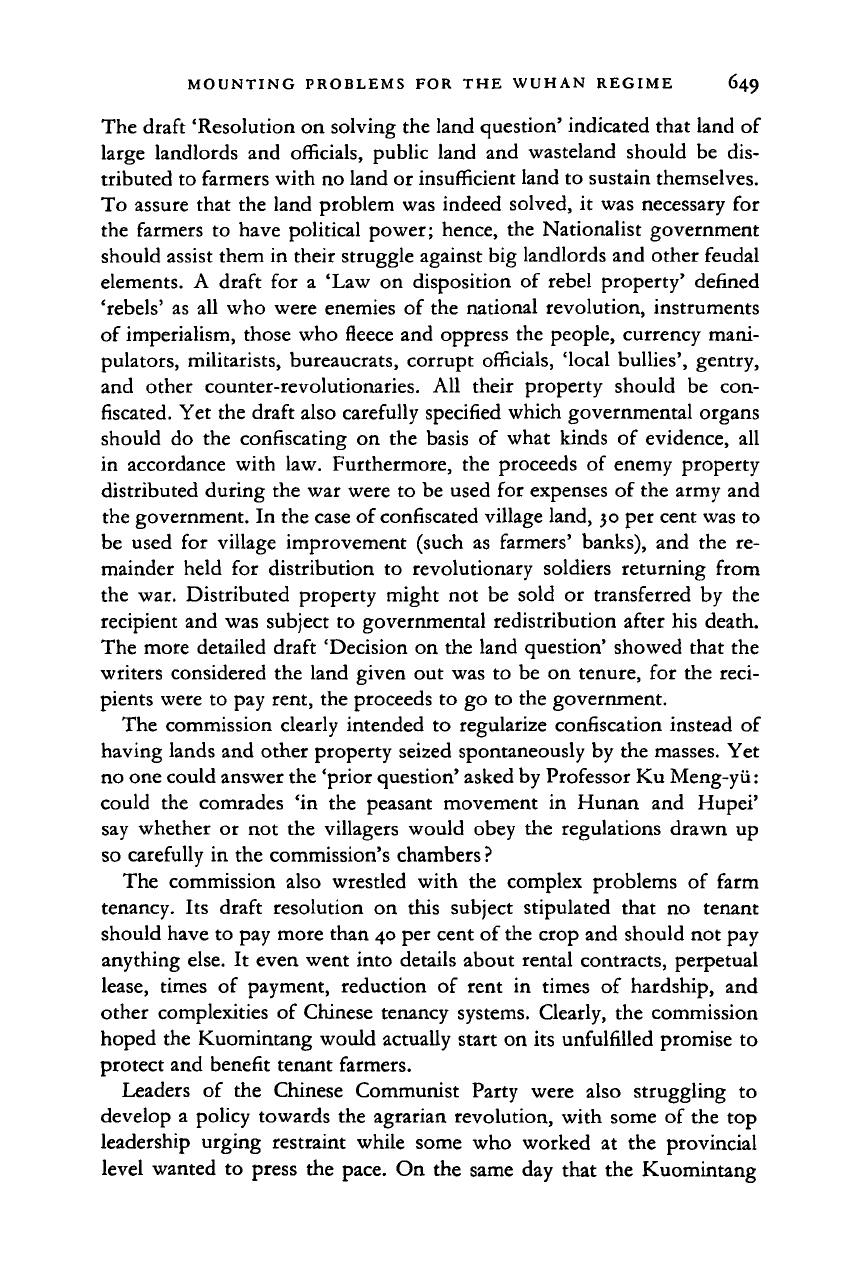
MOUNTING PROBLEMS FOR THE WUHAN REGIME 649
The draft 'Resolution on solving the land question' indicated that land of
large landlords and officials, public land and wasteland should be dis-
tributed to farmers with no land or insufficient land to sustain themselves.
To assure that the land problem was indeed solved, it was necessary for
the farmers to have political power; hence, the Nationalist government
should assist them in their struggle against big landlords and other feudal
elements. A draft for a 'Law on disposition of rebel property' denned
'rebels' as all who were enemies of the national revolution, instruments
of imperialism, those who fleece and oppress the people, currency mani-
pulators, militarists, bureaucrats, corrupt officials, 'local bullies', gentry,
and other counter-revolutionaries. All their property should be con-
fiscated. Yet the draft also carefully specified which governmental organs
should do the confiscating on the basis of what kinds of evidence, all
in accordance with law. Furthermore, the proceeds of enemy property
distributed during the war were to be used for expenses of the army and
the government. In the case of confiscated village land, 30 per cent was to
be used for village improvement (such as farmers' banks), and the re-
mainder held for distribution to revolutionary soldiers returning from
the war. Distributed property might not be sold or transferred by the
recipient and was subject to governmental redistribution after his death.
The more detailed draft 'Decision on the land question' showed that the
writers considered the land given out was to be on tenure, for the reci-
pients were to pay rent, the proceeds to go to the government.
The commission clearly intended to regularize confiscation instead of
having lands and other property seized spontaneously by the masses. Yet
no one could answer the 'prior question' asked by Professor Ku Meng-yii:
could the comrades 'in the peasant movement in Hunan and Hupei'
say whether or not the villagers would obey the regulations drawn up
so carefully in the commission's chambers
?
The commission also wrestled with the complex problems of farm
tenancy. Its draft resolution on this subject stipulated that no tenant
should have to pay more than 40 per cent of the crop and should not pay
anything else. It even went into details about rental contracts, perpetual
lease, times of payment, reduction of rent in times of hardship, and
other complexities of Chinese tenancy systems. Clearly, the commission
hoped the Kuomintang would actually start on its unfulfilled promise to
protect and benefit tenant farmers.
Leaders of the Chinese Communist Party were also struggling to
develop a policy towards the agrarian revolution, with some of the top
leadership urging restraint while some who worked at the provincial
level wanted to press the pace. On the same day that the Kuomintang
Cambridge Histories Online © Cambridge University Press, 2008
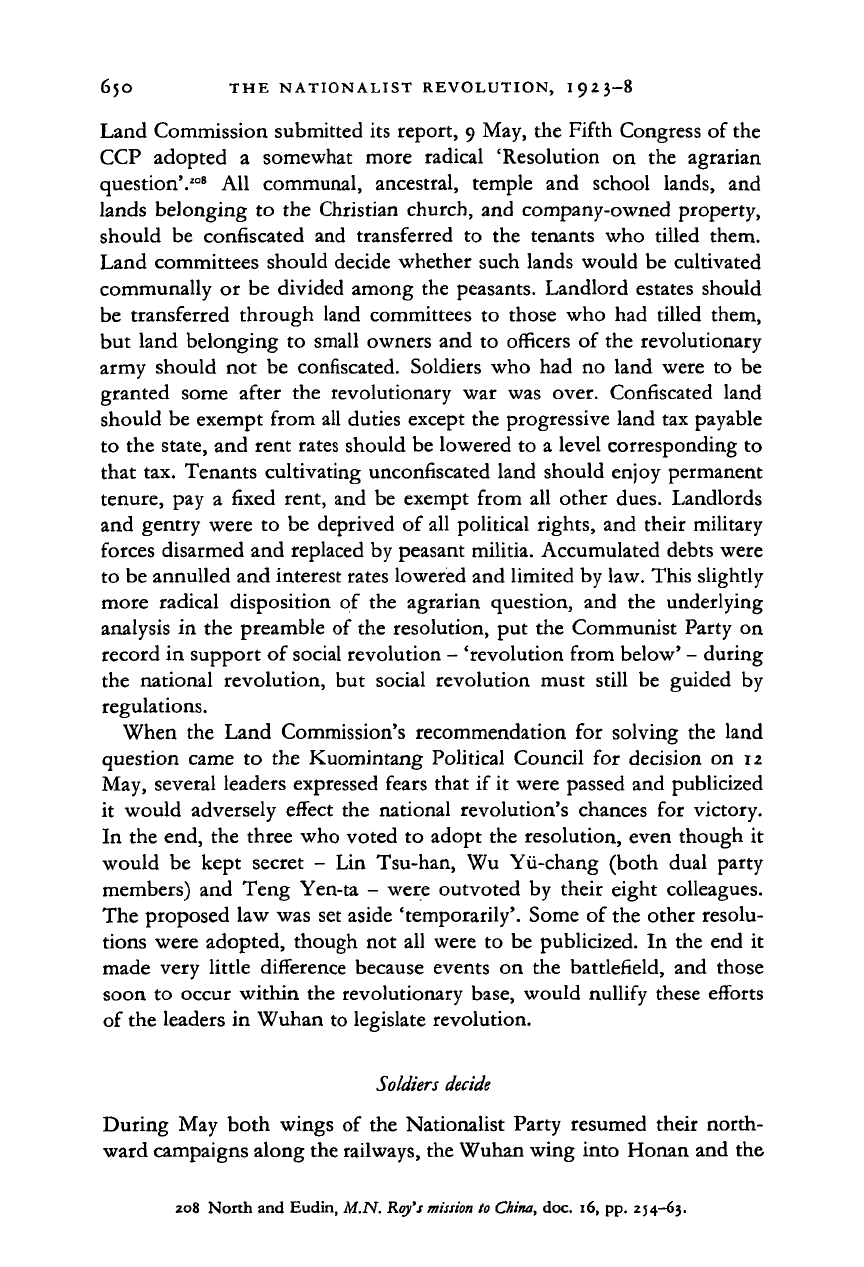
650 THE NATIONALIST REVOLUTION, I 9 2 3-8
Land Commission submitted its report, 9 May, the Fifth Congress of the
CCP adopted a somewhat more radical 'Resolution on the agrarian
question'.
208
All communal, ancestral, temple and school lands, and
lands belonging to the Christian church, and company-owned property,
should be confiscated and transferred to the tenants who tilled them.
Land committees should decide whether such lands would be cultivated
communally or be divided among the peasants. Landlord estates should
be transferred through land committees to those who had tilled them,
but land belonging to small owners and to officers of the revolutionary
army should not be confiscated. Soldiers who had no land were to be
granted some after the revolutionary war was over. Confiscated land
should be exempt from all duties except the progressive land tax payable
to the state, and rent rates should be lowered to a level corresponding to
that tax. Tenants cultivating unconfiscated land should enjoy permanent
tenure, pay a fixed rent, and be exempt from all other dues. Landlords
and gentry were to be deprived of all political rights, and their military
forces disarmed and replaced by peasant militia. Accumulated debts were
to be annulled and interest rates lowered and limited by law. This slightly
more radical disposition of the agrarian question, and the underlying
analysis in the preamble of the resolution, put the Communist Party on
record in support of social revolution - 'revolution from below' - during
the national revolution, but social revolution must still be guided by
regulations.
When the Land Commission's recommendation for solving the land
question came to the Kuomintang Political Council for decision on 12
May, several leaders expressed fears that if it were passed and publicized
it would adversely effect the national revolution's chances for victory.
In the end, the three who voted to adopt the resolution, even though it
would be kept secret - Lin Tsu-han, Wu Yii-chang (both dual party
members) and Teng Yen-ta - were outvoted by their eight colleagues.
The proposed law was set aside 'temporarily'. Some of the other resolu-
tions were adopted, though not all were to be publicized. In the end it
made very little difference because events on the battlefield, and those
soon to occur within the revolutionary base, would nullify these efforts
of the leaders in Wuhan to legislate revolution.
Soldiers decide
During May both wings of the Nationalist Party resumed their north-
ward campaigns along the railways, the Wuhan wing into Honan and the
208 North and Eudin, M.N. Roy's
mission
to
China,
doc. 16, pp. 254-63.
Cambridge Histories Online © Cambridge University Press, 2008
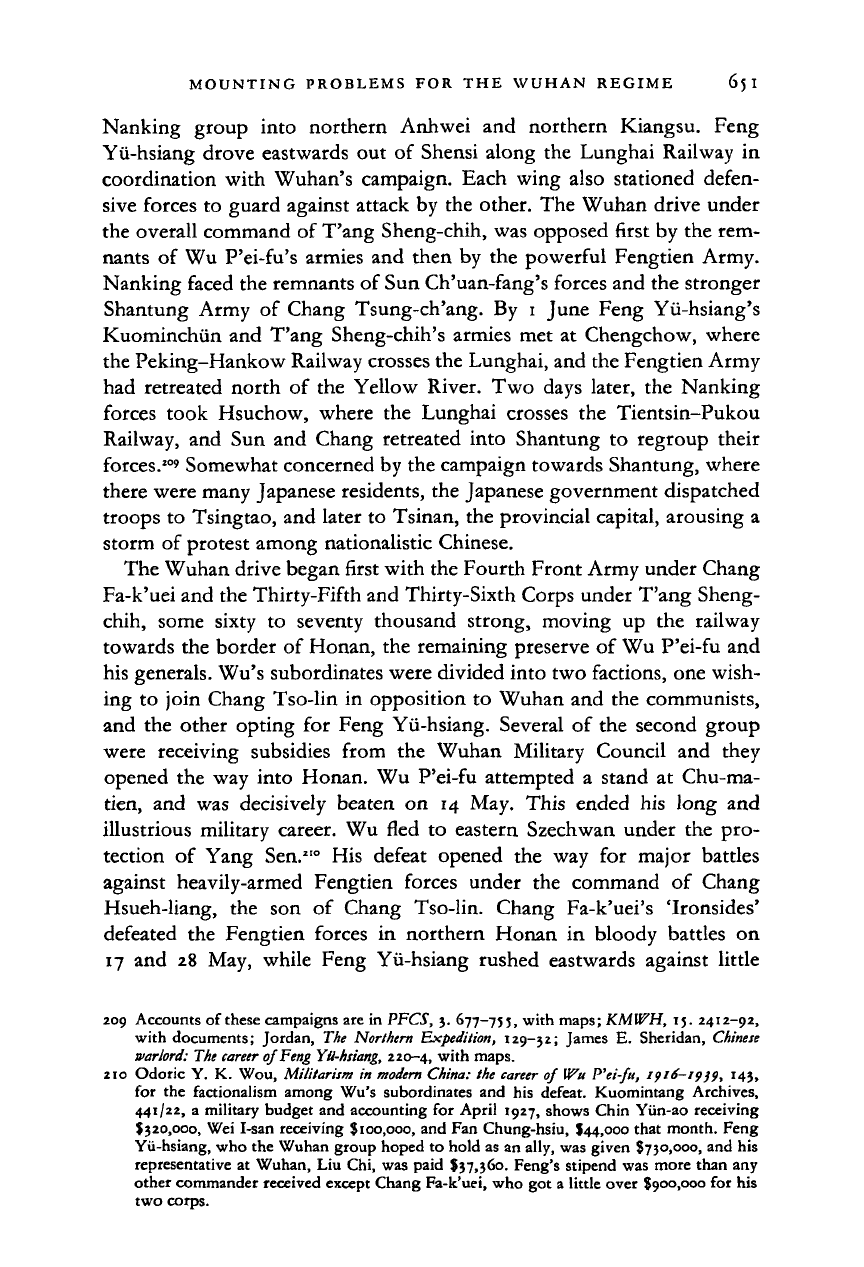
MOUNTING PROBLEMS
FOR THE
WUHAN REGIME
65 I
Nanking group into northern Anhwei
and
northern Kiangsu. Feng
Yii-hsiang drove eastwards
out of
Shensi along
the
Lunghai Railway
in
coordination with Wuhan's campaign. Each wing also stationed defen-
sive forces
to
guard against attack
by the
other.
The
Wuhan drive under
the overall command
of
T'ang Sheng-chih,
was
opposed first
by the rem-
nants
of Wu
P'ei-fu's armies
and
then
by the
powerful Fengtien Army.
Nanking faced
the
remnants
of
Sun Ch'uan-fang's forces
and the
stronger
Shantung Army
of
Chang Tsung-ch'ang.
By i
June Feng Yu-hsiang's
Kuominchun
and
T'ang Sheng-chih's armies
met at
Chengchow, where
the Peking-Hankow Railway crosses
the
Lunghai,
and the
Fengtien Army
had retreated north
of the
Yellow River.
Two
days later,
the
Nanking
forces took Hsuchow, where
the
Lunghai crosses
the
Tientsin-Pukou
Railway,
and Sun and
Chang retreated into Shantung
to
regroup their
forces."
9
Somewhat concerned
by the
campaign towards Shantung, where
there were many Japanese residents,
the
Japanese government dispatched
troops
to
Tsingtao,
and
later
to
Tsinan,
the
provincial capital, arousing
a
storm
of
protest among nationalistic Chinese.
The Wuhan drive began first with
the
Fourth Front Army under Chang
Fa-k'uei
and the
Thirty-Fifth
and
Thirty-Sixth Corps under T'ang Sheng-
chih, some sixty
to
seventy thousand strong, moving
up the
railway
towards
the
border
of
Honan,
the
remaining preserve
of Wu
P'ei-fu
and
his generals.
Wu's
subordinates were divided into
two
factions,
one
wish-
ing
to
join Chang Tso-lin
in
opposition
to
Wuhan
and the
communists,
and
the
other opting
for
Feng Yii-hsiang. Several
of the
second group
were receiving subsidies from
the
Wuhan Military Council
and
they
opened
the way
into Honan.
Wu
P'ei-fu attempted
a
stand
at
Chu-ma-
tien,
and was
decisively beaten
on 14 May.
This ended
his
long
and
illustrious military career.
Wu
fled
to
eastern Szechwan under
the pro-
tection
of
Yang Sen.
210
His
defeat opened
the way for
major battles
against heavily-armed Fengtien forces under
the
command
of
Chang
Hsueh-liang,
the son of
Chang Tso-lin. Chang Fa-k'uei's 'Ironsides'
defeated
the
Fengtien forces
in
northern Honan
in
bloody battles
on
17
and 28 May,
while Feng Yii-hsiang rushed eastwards against little
209 Accounts of these campaigns are in PFCS, 3. 677—755, with maps;
KMWH,
15. 2412-92,
with documents; Jordan, The Northern Expedition, 129-32; James E. Sheridan,
Chinese
warlord: The
career
of Feng
YU-hsiang,
220-4, with maps.
210
Odoric Y. K. Wou, Militarism in
modern
China:
the
career
of Wu P'ei-fu, 1916-19)9, 143,
for the factionalism among Wu's subordinates and his defeat. Kuomintang Archives,
441/22,
a military budget and accounting for April 1927, shows Chin Yiin-ao receiving
$320,000, Wei I-san receiving $100,000, and Fan Chung-hsiu, $44,000 that month. Feng
Yii-hsiang, who the Wuhan group hoped to hold as an ally, was given $730,000, and his
representative at Wuhan, Liu Chi, was paid $37,360. Feng's stipend was more than any
other commander received except Chang Fa-k'uei, who got a little over $900,000 for his
two corps.
Cambridge Histories Online © Cambridge University Press, 2008
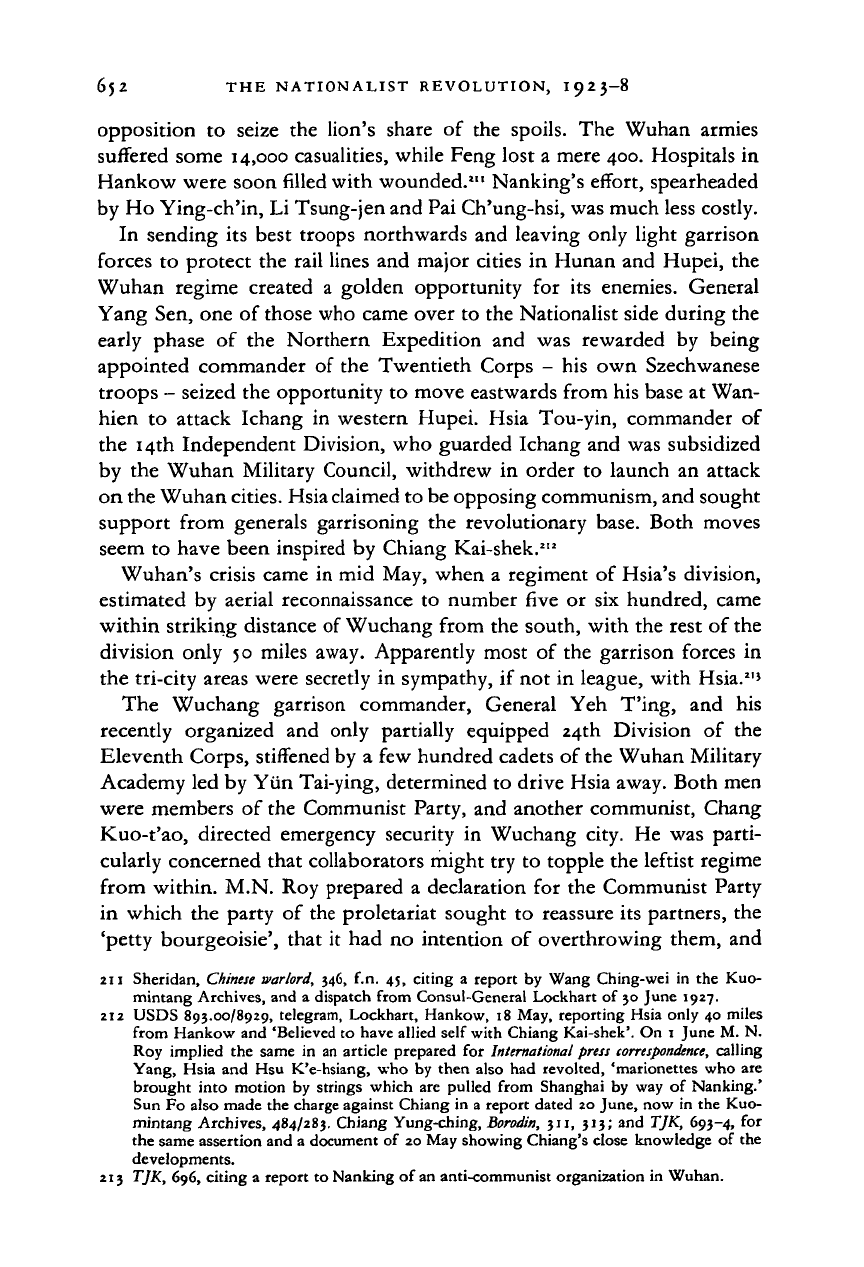
6j2 THE NATIONALIST REVOLUTION, I923-8
opposition
to
seize
the
lion's share
of
the
spoils.
The
Wuhan armies
suffered some 14,000 casualities, while Feng lost
a
mere 400. Hospitals
in
Hankow were soon filled with wounded.
1
" Nanking's effort, spearheaded
by
Ho
Ying-ch'in,
Li
Tsung-jen and
Pai
Ch'ung-hsi, was much less costly.
In sending
its
best troops northwards
and
leaving only light garrison
forces
to
protect
the
rail lines
and
major cities
in
Hunan
and
Hupei,
the
Wuhan regime created
a
golden opportunity
for its
enemies. General
Yang
Sen, one of
those
who
came over
to the
Nationalist side during
the
early phase
of
the
Northern Expedition
and
was
rewarded
by
being
appointed commander
of
the
Twentieth Corps
-
his own
Szechwanese
troops
-
seized
the
opportunity
to
move eastwards from
his
base
at
Wan-
hien
to
attack Ichang
in
western Hupei. Hsia Tou-yin, commander
of
the
14th
Independent Division,
who
guarded Ichang
and was
subsidized
by
the
Wuhan Military Council, withdrew
in
order
to
launch
an
attack
on the Wuhan cities. Hsia claimed
to be
opposing communism, and sought
support from generals garrisoning
the
revolutionary base. Both moves
seem
to
have been inspired
by
Chiang Kai-shek.
212
Wuhan's crisis came
in mid May,
when
a
regiment
of
Hsia's division,
estimated
by
aerial reconnaissance
to
number five
or
six
hundred, came
within striking distance
of
Wuchang from
the
south, with
the
rest
of
the
division only
50
miles away. Apparently most
of
the
garrison forces
in
the tri-city areas were secretly
in
sympathy,
if
not in
league, with Hsia.
215
The Wuchang garrison commander, General
Yeh
T'ing,
and his
recently organized
and
only partially equipped 24th Division
of the
Eleventh Corps, stiffened
by
a
few
hundred cadets
of
the Wuhan Military
Academy
led by
Yiin Tai-ying, determined
to
drive Hsia away. Both
men
were members
of
the Communist Party,
and
another communist, Chang
Kuo-t'ao, directed emergency security
in
Wuchang city.
He was
parti-
cularly concerned that collaborators might
try to
topple
the
leftist regime
from within.
M.N. Roy
prepared
a
declaration
for the
Communist Party
in which
the
party
of
the
proletariat sought
to
reassure
its
partners,
the
'petty bourgeoisie', that
it
had no
intention
of
overthrowing them,
and
211 Sheridan,
Chinese
warlord,
346,
f.n.
45, citing
a
report
by
Wang Ching-wei
in the
Kuo-
mintang Archives, and
a
dispatch from Consul-General Lockhart
of
30 June 1927.
212 USDS 893.00/8929, telegram, Lockhart, Hankow, 18 May, reporting Hsia only 40 miles
from Hankow and 'Believed
to
have allied self with Chiang Kai-shek'.
On
1 June M.
N.
Roy implied
the
same
in an
article prepared
for
International
press
correspondence,
calling
Yang, Hsia
and Hsu
K'e-hsiang, who
by
then also
had
revolted, 'marionettes who
are
brought into motion
by
strings which
are
pulled from Shanghai
by
way
of
Nanking.'
Sun
Fo
also made the charge against Chiang
in a
report dated 20 June, now
in the
Kuo-
mintang Archives, 484/283. Chiang Yung-ching,
Borodin,
311, 313; and TJK, 693-4,
for
the same assertion and
a
document
of
20 May showing Chiang's close knowledge
of the
developments.
213 TJK, 696, citing
a
report to Nanking
of
an anti-communist organization
in
Wuhan.
Cambridge Histories Online © Cambridge University Press, 2008
